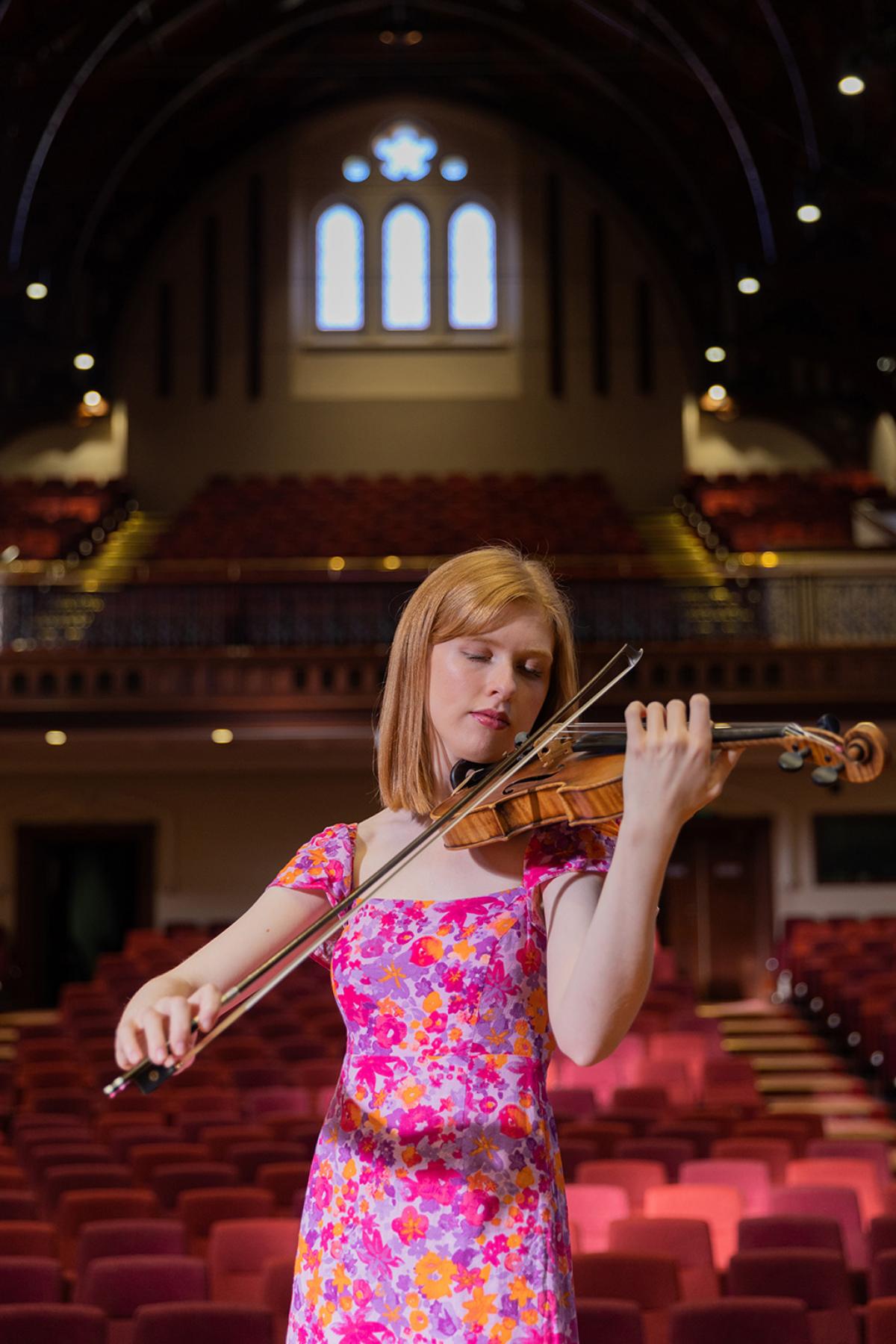Meet the soloist: Tahlia Williams performs Mendelssohn's Violin Concerto

Violinist Tahlia Williams is currently undertaking Honours in Classical Performance at the Elder Conservatorium of Music under Dr. Elizabeth Layton, having completed her Bachelor of Music (Advanced) in 2022.
Tahlia has a range of experience in solo, orchestral and chamber music, with recent performance highlights including performances with Raindance Trio, the Elder Music Lab, Adelaide Baroque, the Adelaide Cantata Band and the Australian Youth Orchestra’s Landa Chamber Orchestra. Tahlia has also held principal positions in the Elder Conservatorium Symphony Orchestra, the Elder Conservatorium Chamber Orchestra and the Adelaide Youth Orchestra.
Throughout her University studies, Tahlia has received a number of prizes including the Kamala Khurana Music Scholarship, the Gustav Reimers Prize, the Eugene Alderman Prize and the Peter Brooker Prize for Musical Excellence. In May 2023 she was selected as Valedictorian for her Graduation Ceremony.
With an eye to the future, Tahlia looks forward to pursuing a career in music, where she intends to further engage in creative collaborations and chamber music performance. Tahlia’s other interests include literature and history, and she is currently completing a Diploma in Languages (German Studies) at the University of Adelaide.
We asked Tahlia a few questions ahead of her performance in this Friday's Lunchtime Concert:
- What is your background?
I am a violinist from Adelaide. After being home-schooled, I commenced my studies at the Elder Conservatorium in 2020.
- Tell us about your experience studying at the Elder Conservatorium of Music.
I am so grateful for the opportunities that I have been given here at the Elder Conservatorium over the past four years. The faculty hold such a vast array of experience and insight and I have learnt so much from performing in the Conservatorium Orchestras, the annual Baroque Academy, and the Elder Music Lab. I have also formed many special friendships, which I know will continue as we develop our careers making music together!
- What is it like to perform as a soloist with the Elder Conservatorium Symphony Orchestra?
The Mendelssohn Violin Concerto is a piece that has delighted me since my childhood, when I would listen to Hilary Hahn’s recording on repeat and optimistically try to teach myself the opening theme! It’s such a joy to be able to perform it now with all the interest and timbre that the orchestra adds, and it’s been an honour to share this experience with my friends here at the Con, and to learn from the expertise of Liz and Luke about the process of preparing a concerto.
- How did you first start learning your instrument?
I started studying the violin with Kai Wang when I was seven years old, following in my older sister’s footsteps. Paris and I have since enjoyed sharing our musical journeys and performing together as a duo, in Raindance Trio and numerous string quartets.
- Is there anything special about the instrument you play?
I am currently playing on a 1937 A.E. Smith violin, which is on loan from the Elder Conservatorium. The violin has a beautiful, warm tone and it’s such a delight to explore the broad range of colours and textures which the instrument offers.
Tahlia has written a program note about the work she is performing:
Felix Mendelssohn was born into a wealthy and influential German-Jewish family, whose members included his father, the prominent banker Abraham Mendelssohn, and his grandfather, the respected philosopher Moses Mendelssohn. Among a multitude of talents nurtured by their enlightened education, Felix and his sister Fanny both displayed an aptitude for musical accomplishment from a young age, and from the milieu of the Mendelssohn household, Felix soon emerged to secure his place among the most significant composers of the 19th century.
While much of Mendelssohn’s oeuvre comprises orchestral and chamber music, his patient composition of the Violin Concerto in E minor resulted in one of the most iconic works in the violin repertory. After six years of intermittent composition, it was finally premiered in 1845 by the violinist Ferdinand David, and its popularity has endured ever since its acclaimed first performance.
When comparing the work to the other great German violin concerti, violinist Joseph Joachim described it as ‘the most inward, the heart’s jewel’, and certainly the unassuming character, poignant melodies and thoughtful orchestration result in a piece which is somehow both candidly radiant and deeply personal.
Although much of Mendelssohn’s music is influenced by classical compositional techniques, he was certainly not averse to innovation, and incorporated some novel elements into the composition of this work. For example, the opening statement of the theme in the first movement is introduced immediately by the solo violin – a departure from the traditional, expansive orchestral exposition. The middle of the movement also features a remarkable arpeggiated cadenza, which David and Mendelssohn collaborated on, marking a break in the tradition for a soloist to improvise their own cadenza.
A sustained B in the bassoon segues into the second movement Andante. Mendelssohn was a prolific composer of songs, and is credited with coining the term ‘song without words’ – a style of highly lyrical composition. This movement clearly alludes to this genre, with a beautiful, surprisingly simple melody juxtaposed against the middle section’s flowing, passionate conversation between the violin and orchestra.
The third movement is introduced by a simple, folk-like melodic interlude, which transitions into the main part of the movement. Predominantly in E Major, the Allegro molto vivace sits in stark contrast to the preceding movement’s gentle character, with its ebullient thematic material continually reappearing within the movement’s sonata-rondo form. Imagery of fireworks, fanfares and dances can all be brought to mind when listening to this colourful music.
Join us on Friday at 1:10pm to hear Tahlia perform with the Elder Conservatorium Symphony Orchestra.
